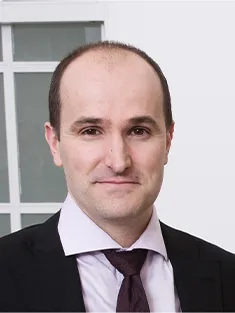Professor Marc Vendrell
Prize
Bader Prize for Organic ChemistryYear
2023
Organisation
University of Edinburgh
Citation
For the design and synthesis of activatable fluorophores, and their application in high-resolution biological imaging and translational medicine.

Professor Vendrell’s work focuses on the preparation of new chemical compounds to help us visualise and understand how cells behave inside our bodies. In the lab, they make very specific fluorescent compounds that can bind to cells associated with disease, such as tumour cells or pathogens. They can then see where they are, how many of them there are, and how they are responding to treatment. Using these fluorescent molecules during clinical imaging, or as part of clinical assays in the lab, means earlier and better diagnosis of disease and also help clinicians choose the right treatment for patients.
Biography
Professor Marc Vendrell graduated in chemistry at the University of Barcelona in 2007 before joining the Singapore Bioimaging Consortium to work with Professor Young-Tae Chang in synthetic fluorophores for optical imaging. He started his independent career as Academic Fellow at the University of Edinburgh (UoE) in 2012 with the vision to translate chemical fluorophores to the clinic. His team has pioneered the design of activatable fluorophores with exquisite cell specificity and sensitivity. They have also built an ambitious research programme linking chemistry and medicine through competitive funding, including several programme grants and a prestigious ERC Consolidator Grant in 2017. Marc serves on advisory boards for different companies. He is co-inventor of 12 patents and is the academic lead of several license and collaborative projects with biotech and pharma companies. His research has been recognised with several distinctions and awards, including the SEQT Young Investigator Award (2007), the SBIC Chairman's Prize (2010), the Marcial Moreno Lectureship (2018), the SRUK Emerging Talent Award (2019), and the UoE Principal's Medal Award (2020). Since 2020, he has held the position of Personal Chair of Translational Chemistry and Biomedical Imaging at the UoE. Marc is currently the chemistry lead for Translational Healthcare Technologies and the head of the IRR Chemistry Hub at the College of Medicine and Veterinary Medicine at the UoE.
Q&A with Professor Marc Vendrell
How did you first become interested in chemistry?
I became interested in chemistry when I was at high school but I was shy and unsure if it was for me. Luckily, my chemistry teacher encouraged me to take part in the regional Chemistry Olympiad, which I won! At that time, I realised it was something that I could dedicate my efforts to.
What motivates you?
My motivation is to train the next generation of scientists to work across disciplines (chemistry, biology, medicine, engineering, etc) and across sectors (academia, industry, NHS, etc) to develop new technologies that can address unmet healthcare challenges, and also to inspire them to translate those technologies to real-life applications for the benefit of society.
Why is chemistry important?
Everything is chemistry! From the materials we use every day in our lives, the food we eat, the drugs we need to cure disease ... And we need more chemists to convey this message to other scientists so that they can realise that by using chemistry in their own disciplines and research, they can have a better understanding of the systems they study.
What has been a highlight for you (either personally or in your career)?
One of the most rewarding parts of my job is to train younger scientists, such as students and postdocs, and see them growing over the years as we work together. Everyone learns at a different pace and every individual has their own skills and talents, but it is always exciting to experience first-hand their transition towards being independent scientists.